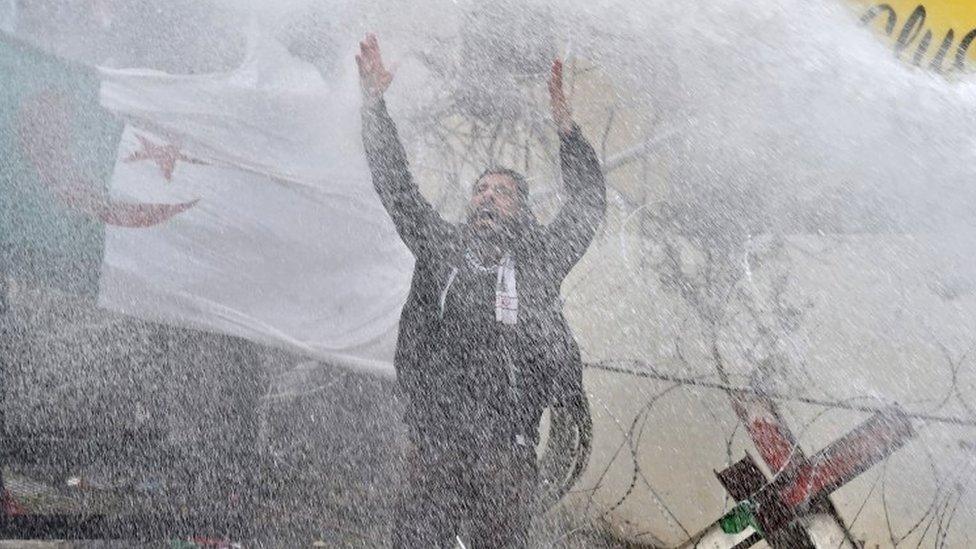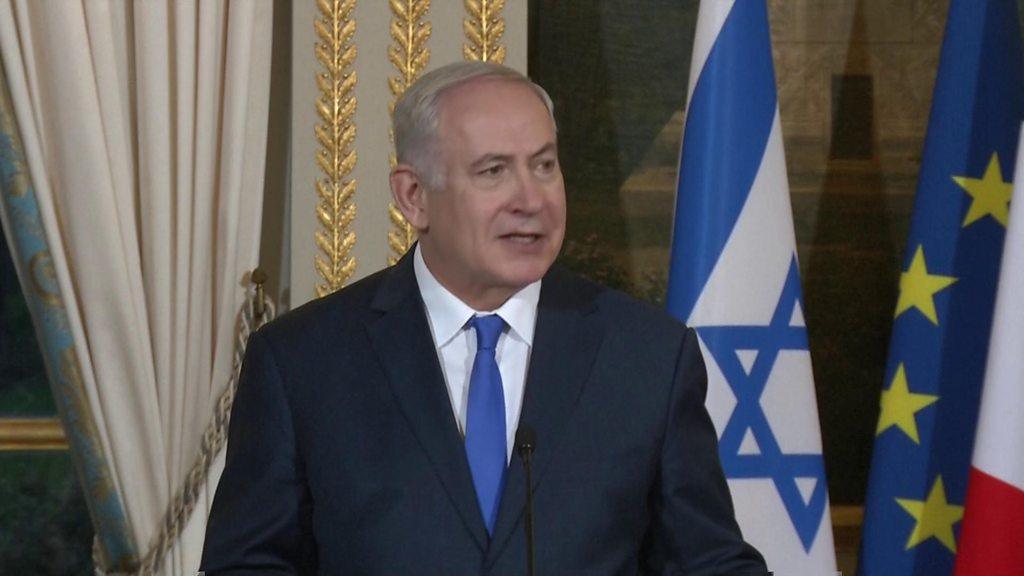Netanyahu: Palestinians must face reality over Jerusalem
- Published
Protests in Beirut turn ugly again
Israel's prime minister has said Palestinians must "get to grips with" the reality that Jerusalem is Israel's capital in order to move towards peace.
Benjamin Netanyahu said Jerusalem had been the capital of Israel for 3,000 years and had "never been the capital of any other people".
He spoke amid ongoing protests in the Muslim and Arab world at a US decision recognising Jerusalem as the capital.
Violence flared near the US embassy in Lebanon and elsewhere on Sunday.
In Jerusalem itself, a Palestinian was arrested after stabbing and seriously wounding an Israeli security guard at the central bus station.
Netanyahu: Paris is the capital of France, Jerusalem is the capital of Israel
Speaking in Paris after talks with French President Emmanuel Macron, Mr Netanyahu said efforts to deny the "millennial connection of the Jewish people to Jerusalem" were "absurd".
"You can read it in a very fine book - it's called the Bible," he said. "You can read it after the Bible. You can hear it in the history of Jewish communities throughout our diaspora... Where else is the capital of Israel, but in Jerusalem?
"The sooner the Palestinians come to grips with this reality, the sooner we will move towards peace."
Meanwhile a spokesman for the US Vice-President, Mike Pence, strongly criticised the Palestinian Authority, saying it was "unfortunate" that Palestinian President Mahmoud Abbas was declining to meet Mr Pence on his forthcoming trip to the region.
In Egypt, the country's top Muslim and Christian clerics have also cancelled scheduled talks with Mr Pence in protest at the US move.
Raft of protests
There has been widespread condemnation of President Donald Trump's decision - announced on Wednesday - to reverse decades of US neutrality on the status of Jerusalem which cuts to the heart of the ongoing conflict between Israel and the Palestinians.
The city is home to key religious sites sacred to Judaism, Islam and Christianity, especially in East Jerusalem.
Israel has always regarded Jerusalem as its capital, while the Palestinians claim East Jerusalem - occupied by Israel in the 1967 war - as the capital of a future Palestinian state.
Sunday has seen a further raft of protests at the US move:
In Beirut, riot police used teargas and water cannon to stop hundreds of protesters from reaching the US embassy
Further protests took place in Cairo and Rabat, the Moroccan capital
In the Palestinian territories themselves protests continued while Israel said it had blown up a tunnel from Gaza, which it says was being dug to enable militant attacks
Thousands of people demonstrated outside the US embassy in the Indonesian capital, Jakarta, some waving banners reading "Palestine is in our hearts"
A burning object was thrown at a synagogue in the Swedish city of Gothenburg late on Saturday in what police said was a failed arson attempt
Vicious row between two leaders
In Turkey, President Recep Tayyip Erdoğan told a large rally in Istanbul he would not abandon Jerusalem to a state that "kills children".
Mr Netanyahu said the Turkish leader had "attacked Israel".
"I'm not used to receiving lectures about morality from a leader who bombs Kurdish villages in his native Turkey, who jails journalists, helps Iran go around international sanctions and who helps terrorists, including in Gaza, kill innocent people," he added.
Mr Erdoğan has described Jerusalem as a "red line" issue for Muslims and warned Turkey could end up severing diplomatic ties with Israel over the issue.
Turkey and Israel only restored diplomatic relations last year, six years after Turkey cut ties in protest at the killing of nine pro-Palestinian Turkish activists in clashes with Israeli commandos on board a ship trying to break Israel's naval blockade of Gaza.
- Published10 December 2017

- Published10 December 2017
